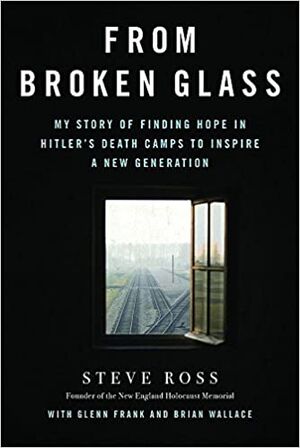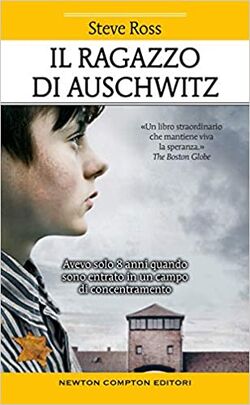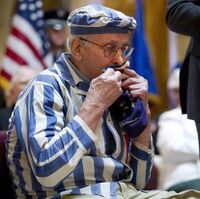Steve Ross / Szmulek Rozental (M / Poland, 1931-2020), Holocaust survivor
Steve Ross / Szmulek Rozental (M / Poland, 1931-2020), Holocaust survivor
- KEYWORDS : <Auschwitz> <Dachau> <Liberation of Dachau> -- <United States>
- MEMOIRS : "From Broken Glass: My Story of Finding Hope in Hitler's Death Camps to Inspire a New Generation" (2018)
Biography
Holocaust survivor Steve (Stephan) Ross z”l was born in 1931 near Łódź, Poland. He spent five years in ten different concentration camps, including Budzyń, Auschwitz, and Dachau. He survived medical experiments, starvation, sexual abuse, and brutal beatings on a daily basis. When Ross was liberated from Dachau in April 1945, he was 14 years old and weighed 50 lbs. Among the American troops who liberated the camp was Lt. Steve Sattler, whose act of kindness restored Ross’s hope in humanity, even after everything he had been through. When Lt. Sattler saw Ross, he jumped down from atop his tank, hugged the emaciated child, and shared his food rations with him. He also gave the boy a handkerchief decorated with the American flag. After the war, Ross settled in the Boston area where he became a social worker and spent his life helping at-risk youth. When speaking to students about his experience, he would carefully unfurl the American flag handkerchief 🇺🇸, and share how one small act of kindness can transform a life.
Book : From Broken Glass (2018)
"From the survivor of ten Nazi concentration camps who went on to create the New England Holocaust Memorial, a "devastating ... inspirational" memoir (The Today Show) about finding strength in the face of despair ... On August 14, 2017, two days after a white-supremacist activist rammed his car into a group of anti-Fascist protestors, killing one and injuring nineteen, the New England Holocaust Memorial was vandalized for the second time in as many months. At the base of one of its fifty-four-foot glass towers lay a pile of shards. For Steve Ross, the image called to mind Kristallnacht, the Night of Broken Glass in which German authorities ransacked Jewish-owned buildings with sledgehammers ... Ross was eight years old when the Nazis invaded his Polish village, forcing his family to flee. He spent his next six years in a day-to-day struggle to survive the notorious camps in which he was imprisoned, Auschwitz-Birkenau and Dachau among them. When he was finally liberated, he no longer knew how old he was, he was literally starving to death, and everyone in his family except for his brother had been killed ... Ross learned in his darkest experiences--by observing and enduring inconceivable cruelty as well as by receiving compassion from caring fellow prisoners--the human capacity to rise above even the bleakest circumstances. He decided to devote himself to underprivileged youth, aiming to ensure that despite the obstacles in their lives they would never experience suffering like he had. Over the course of a nearly forty-year career as a psychologist working in the Boston city schools, that was exactly what he did. At the end of his career, he spearheaded the creation of the New England Holocaust Memorial, a site millions of people including young students visit every year ... Equal parts heartrending, brutal, and inspiring, From Broken Glass is the story of how one man survived the unimaginable and helped lead a new generation to forge a more compassionate world."--Publisher description.
"Il 29 ottobre 1939 la vita di Szmulek Rozental cambia per sempre. I nazisti marciano sul villaggio dove abita, in Polonia, distruggendo le sinagoghe e cacciando i rabbini. Due persone muoiono durante quel primo giorno di saccheggio, ma il peggio deve ancora arrivare. Molto presto tutta la sua famiglia sarà uccisa, e Szmulek, a soli otto anni, è costretto ad affrontare l'incubo dell'Olocausto. Con tenacia e determinazione e grazie all'aiuto di altri prigionieri, sopravvive ad alcuni tra i più letali campi di concentramento, tra cui Dachau, Auschwitz, Bergen Belsen. Stuprato, picchiato, sottoposto per sei anni a ogni genere di privazione, vede la sua famiglia e i suoi amici morire. Ma essere riuscito a sopravvivere a questo inferno lo ha spinto a combattere per raccontare alle generazioni future gli errori che non dovranno mai più essere commessi. Dopo la liberazione da parte degli americani, si è trasferito a Boston dove, sotto il nome di Steve Ross, ha cominciato una nuova vita, lavorando costantemente per tenere viva la memoria degli orrori delle persecuzioni. Questo libro è la sua testimonianza."--Publisher description.
Obituary (25 February 2020)
Steve Ross, a Holocaust survivor who founded the New England Holocaust Memorial in Boston, died this week, officials said.
Ross, who was in his 80s at the time of his death, was born the youngest of eight children in Lodz, Poland in 1931, The Boston Globe reported. Nearly his entire family, including his parents, Basia and Josef Rozental, were killed in the Holocaust, the systemic genocide of approximately 6 million Jewish individuals by the Nazis during World War II.
Ross and one of his brothers were the only members of the family to survive the Holocaust. The brother, Harry Ross, later died in the 1980s, according to the newspaper’s report.
“Boston lost a giant, and the world quite honestly lost a giant. Here’s a man who could have given up several times in his life and he didn’t. I’m very sad today at the loss of Steve Ross,” Boston Mayor Marty Walsh tweeted.
The Globe reported that Ross, who died Monday evening, had lived in Newton for many years and was previously a resident of the Dorchester and Jamaica Plain neighborhoods. He came to the U.S. in the late 1940s as a refugee after World War II.
In the 1990s, Ross sought a formal way to remember his family members as well as other victims of the Holocaust and the soldiers who liberated the death camps, according to the memorial’s website.
German authorities, during the 1940s, targeted several groups who they saw as racially inferior, including disabled individuals as well as Romani and Slavic people. Others were persecuted for their political beliefs, religions and sexual orientations, among them Communists, Jehovah’s Witnesses, members of LGBTQ community and Socialists.
“He wanted this memorial to serve as a lesson to future generations,” the website says of Ross.
The Holocaust survivor formed a committee to put together a proposal for the memorial, and several public officials in Boston, including then-Mayor Raymond Flynn, supported the effort. The New England Holocaust Memorial was dedicated in a public ceremony on the steps of Boston City Hall Plaza in 1995, the website says.
Ross, whose birth name was Szmulek Rozental, was imprisoned at the age of 9 and survived 10 different concentration camps from 1940 to 1945, according to the memorial’s website. During that time, he suffered abuse, serious injury and atrocity.
“His back was broken by a guard who caught him stealing a raw potato; another time he was hung for eating a potato,” the memorial’s website says. “Tuberculosis wracked his body. He once hid in an outhouse, submerged to his neck in human waste, to save himself from being shot."
The survivor was eventually liberated from the Dachau concentration camp in southern Germany. He was one of more than 32,000 prisoners freed in 1945, according to the United States Holocaust Memorial Museum.
A photograph from the U.S. National Archives and Records Administration shows Ross, as a child, behind a fence at the camp, holding up his arm with a smile during the day of liberation.
“Prisoners with access to records said 9,000 people died of hunger, disease or shooting within the past three months at Dachau. Four thousand more perished during cold winter months," records from the U.S. National Archives and Records Administration say. “When Americans entered the camp, they found 50 open railway cars standing on a siding, apparently full of dirty clothing but actually found to contain hundreds of corpses piled on top of each other.”
Ross, then 16 years old, was brought over to America through the U.S. Committee for Orphaned Children in 1948, the memorial’s website says. He later earned three college degrees and worked for the city of Boston for more than 40 years. The survivor provided guidance and clinical services to youth and families in the community.
“Steve had one dream, one vision and one mission. He wanted to remember, with a memorial, his lost family members among the six million Jewish victims and other innocent people who lost their lives in the Holocaust, those soldiers who liberated the concentration camps; and all the soldiers who helped end the war,” the website says.


